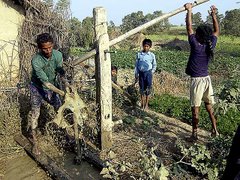 I was so close to finishing it! My chapter on Turkey and Bahrain – it was almost there!
I was so close to finishing it! My chapter on Turkey and Bahrain – it was almost there!It was hard going, to be sure – it’s been an extraordinary couple of weeks and there's a lot to say. And then I arrived in the human cacophony of Mumbai and there's so much to describe it should be gotten down while fresh. So the earlier chapter will follow this one in a couple of days – but for now I beg your patience, and for those who’ve never had the experience, let me do my best to paint a picture of what it's like arriving in India.
It really is far too easy to sit in one’s cushy armchair back in the developed world, knowledgeably discussing approaches to third world poverty, to cite articles and thinkers and NGO models and the like, and to read up on the enormous countries of the developing world which strain under the weight of overpopulation and inequality. It’s too easy to say “yes, well, I’m a do-gooder and believe in progressive taxation and care about the plight of the needy. I understand what they’re going through”. And I’ve travelled much more than most. I’m lucky. In my life I’ve been to places where deprivation is all around and met countless people in countless places. But it’s nothing like here.
Mumbai proudly calls itself the economic capital of India. And it does have more than its share of billionaires and foreign investment and the stock exchange. But it’s not the whole story. It’s barely a footnote or a dust jacket on the whole story. I got in last night and took a taxi ride for two hours through the biggest, heaving mass of humanity you could ever imagine. For two whole hours we passed through shantytowns and suburbs. For two whole hours I saw naked, abandoned toddlers scavenging through detritus, amputees begging, homeless children, literally a couple of hundred thousand people passed by my open taxi. Some came to the side to beg for money or food. Some stared. Some continued selling produce at the roadside as thousands of cars and bikes and rickshaws and buses beeped unceasingly through the blanket of people. The noise is constant. It’s deafening. It’s a sarcophagus of sound. It makes London – in itself an impressively large, busy, noisy and vibrant metropolis – appear a sleepy country hamlet. I really thought that Istanbul – with its 15 million inhabitants and throbbing crowds and unique blend of East and West – was an assault on the senses. And I’ve prepared my mind for arrival in India for months now. But – and I hate resorting to clichés but sometimes there’s nothing else – nothing, nothing, nothing at all can prepare you for the noise, the crowds, the chaos, the squalor, the colours of one of the Indian megalopolises.
The physical stature of the people hits you too. The Indians are not the Dutch or the tribespeople of the Kalahari – that much hardly needs pointing out to anyone who’s ever gone out for a curry. But it’s the effect of malnutrition in the lower castes here that’s so clearly evident. So many men of the darkest skin stand barely 4”10 and weigh less than 50kg. This isn’t just a racial or genetic thing. Most working and middle class Indian men aren’t much shorter than their Western counterparts – although slimmer, to be sure. This is a nutritional problem and a caste problem. And they go hand in hand.
India is, to this day, an extraordinarily tiered society, with the Dalits – the “Untouchables” - occupying the bottom rung of many on the social ladder and living in the direst, most unfair conditions arguably of any social group on the planet. A country which rightly has aspirations of being one of the big geopolitical players of this new century and which will soon overtake China and have the largest population on earth cannot, it cannot, it must not tolerate the prejudice and hardship foisted upon the tens of millions (130m according to one reliable estimate) of people consigned to living in sewers, collecting faeces with their bare hands for pennies, sleeping on piles of rubbish and clearing away dead animals. What their scarce opportunities for work have in common is ritual impurity. Which is exactly how the Dalits are seen by Indians at large. It’s their perceived impurity that keeps them where they are. India should be ashamed of itself.
The situation has improved, it’s important to note, and the Indian Constitution makes special provision for the betterment of their living conditions. But with your own eyes, passing through a reasonable cross-section of Mumbai and watching people in their hundreds of thousands – you can see the multi-layered caste structure as plain as night and day. The lower castes have skin almost black as night and are diminutive through a lifetime of abject want. The Indian working and middle classes have a much paler complexion and stand a foot taller. The upper class is practically white.
But don’t be put off, dear readers! Don’t be scared by the stench of open sewers (which is admittedly vile). Don’t baulk at the suicidal/homicidal traffic behaviour. Don’t be nervous about the yellow air so polluted your throat aches after ten minutes and which has covered my laptop with a film of taupe gunk which I’m fairly certain Apple didn’t build it to withstand. Don’t worry that you’ll cry for the dead and dying animals that litter the roadside (although you might very well). And don’t prevaricate about not being able to shake your head at the most wretched beggar children surrounding you with big eyes and distended bellies (although they will, and you probably won’t).
Don’t be put off by any of it, I implore you. I wrote before leaving London that I feel the need to come face-to-face with real life for most of the world’s people. That I need the perspective that comes only with experiencing (ok, observing) truly grinding poverty and the miserable hopelessness of so many people’s lives. And that only through doing so will I get some appreciation not only of the smallness of my own struggles, but begin to understand people in a way which I have been yet to do. On these travels thus far, during the first eight and a half weeks, it hasn’t really come. Western Europe is fascinating of course, and largely very beautiful. For a student of twentieth century history in particular, it’s heaven. And the former eastern bloc and Balkans is manna for the economist – to see in plain sight the all-pervasive mediocrity of communism and the desperate inequity and disappointment of a transition to liberal capitalism. And Turkey rewards the hedonist and the ancient historian who yearns to walk the land which has been the site of empires waxing and waning for millennia.
But India is the prize, and I’ve been waiting for it for my whole life. Because India – although I am barely off the boat – will reward and tear at your soul. It will, you just know it, it’ll crush and lift the spirit. It’ll bring forth smiles and tears in equal measure, it’ll make you love and hate people both. It’ll be a struggle just to travel across it and give you strength you always craved. It’ll feed the individual's Humanitarian, it’ll spur his compassion and clarity and charity. You can't see the things I’ve seen already – and will come to see in the coming five weeks – without feeling it viscerally. The world is an enormous place with too much to see in a lifetime, but the planet is too small for so many people. India has the population now that the world did when the Wright Brothers first took to the skies. This country might be the economic miracle of the subcontinent and boast a real future as the IT call centre of the West. Which will create more middle class jobs, yes. And by all accounts the relative number of people in poverty is decreasing. That is, I suppose, some good news.
But the problem is the way we throw that word, ‘poverty’, around. We use it to describe welfare mothers in Brixton who can’t afford to eat out. We use it for people who live on sink estates in perpetual debt and complain about the NHS. We use it for apartment buildings without any green space for the kids to play in. Whatever 'poverty' is, though, it has to mean something beyond an abstract term of art encapsulating having less than the majority. It has to refer to miles upon miles upon miles of dilapidated shanties, each with ten people crammed into 5m2 of filth with corrugated iron walls, undrinkable water, and a dollar a day. This is poverty on a spectacular, galactic, unimaginable scale.
But through all this, you still see people finding pleasure in life's little delights. I took a long walk last night through the shantytown. Attracting quite a crowd of giggling followers as I made my way through like a disoriented and pale-faced pied piper, I watched a father playing with his son. A mother laughing at her daughter’s poor attempt at sewing. Children hitting a shuttlecock. I played street cricket with a group of barefoot boys using a piece of pipe and a tennis ball. "Ponting! Steve Waugh!" they shouted at me. "You like Tendulkar?" They were as delighted as me. They don’t really see white faces. In a cumulative four hours in a taxi since yesterday afternoon, I must’ve passed – and I promise I’m not exaggerating here – half a million people. And – again, this is the truth – I have not seen even ONE white face other than my own. Despite the Incredible India! posters that plaster travel agents the world over, most visitors don’t leave the centre of the cities or they stick to slurping cocktails in Goa and photographing the Taj Mahal. They are, I can tell you, really missing out.
So at the risk of sounding unbearably limp, I return to my earlier call: come to India and see for yourself what deprivation really is. Come and meet the people and chat to them and wave to them (they’ll all delightedly wave back) and then – and only then – complain about the water pressure in your shower or the price of a cappuccino or the bugs in Vista and why can’t Microsoft get its act together. None of us have any right to do so – and that is what I came to India to really understand.
Thanks for your indulgence. Stories from Turkey will follow very shortly. Including a crazy sucubus Serbian, an enlightened Kiwi, angry protests, my latest border screw-up, and a hairy Turkish man touching my testicles.



































